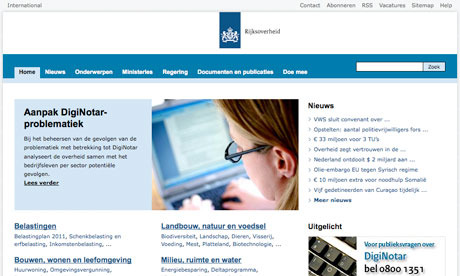Dutch government revokes certificates used for all its secure online transactions, while CIA, Google, Microsoft and others affected by hack called 'worse than Stuxnet'

The Dutch government has revoked all trust in digital certificates issued by DigiNotar
The Dutch government says hackers who broke into a web security firm in the Netherlands last month issued hundreds of bogus security certificates that could be used on websites including the CIA and Israel's Mossad, as well as internet giants such as Google, Microsoft and Twitter.
More than 500 fake certificates, including some which could be used to send fake Windows updates to computers, and others which could be used when connecting to the CIA's site, were fraudulently issued in the hack, which occurred in July.
The Dutch government took the exceptional step of calling a press conference at 1.15am on Saturday morning to announce that it was revoking all trust in digital certificates issued by DigiNotar, which until then had been used for all online tax returns filed in the Netherlands.
The government said that browser companies are now rejecting all security certificates issued by the hacked firm. Microsoft's Internet Explorer, Mozilla Firefox and Google's Chrome will all reject certificates from the company. Apple systems require a manual update. Apple has not made any statement on whether it will revoke DigiNotar certificates.
The fake certificates could in theory be used to monitor users' communications with those sites without them noticing, but only by an organisation that also has the ability to reroute internet traffic to servers they control – most likely a government.
Iran's government has been suspected of involvement in the hack, which led to the creation of hundreds of fake security certificates used to create cryptographically secure links between users and sites. A handful of Iranian users of Google's popular email service are known to have been affected by the faked certificates, which would allow a "man in the middle" attack, where an apparently secure link could in fact be tapped by an intermediary. Security experts noted that earlier this year, Iran announced that it was changing the setup for its domain name servers (DNS) used to make connections to sites – which would give it the ideal opportunity to insert faked certificates into the system.
Roel Schouwenberg of the security company Kaspersky warned that the long-term effects of the DigiNotar hack could be more serious than Stuxnet, a computer "worm" that is believed to have been written by US and Israeli computer experts to attack Iran's nuclear facilities by destabilising computer-controlled systems in its uranium centrifuges.
"The attack on DigiNotar will put cyberwar on or near the top of the political agenda of western governments," he noted on the Securelist blog. "I remain with my stance that a government operation is the most plausible scenario."
He added: "The damage sustained to the Dutch (government) IT infrastructure is quite significant. A lot of services are no longer available. Effectively, communications have been disrupted. Because of this one could make an argument the attack is an act of cyberwar."
More than 500 fake certificates, including some which could be used to send fake Windows updates to computers, and others which could be used when connecting to the CIA's site, were fraudulently issued in the hack, which occurred in July.
The Dutch government took the exceptional step of calling a press conference at 1.15am on Saturday morning to announce that it was revoking all trust in digital certificates issued by DigiNotar, which until then had been used for all online tax returns filed in the Netherlands.
The government said that browser companies are now rejecting all security certificates issued by the hacked firm. Microsoft's Internet Explorer, Mozilla Firefox and Google's Chrome will all reject certificates from the company. Apple systems require a manual update. Apple has not made any statement on whether it will revoke DigiNotar certificates.
The fake certificates could in theory be used to monitor users' communications with those sites without them noticing, but only by an organisation that also has the ability to reroute internet traffic to servers they control – most likely a government.
Iran's government has been suspected of involvement in the hack, which led to the creation of hundreds of fake security certificates used to create cryptographically secure links between users and sites. A handful of Iranian users of Google's popular email service are known to have been affected by the faked certificates, which would allow a "man in the middle" attack, where an apparently secure link could in fact be tapped by an intermediary. Security experts noted that earlier this year, Iran announced that it was changing the setup for its domain name servers (DNS) used to make connections to sites – which would give it the ideal opportunity to insert faked certificates into the system.
Roel Schouwenberg of the security company Kaspersky warned that the long-term effects of the DigiNotar hack could be more serious than Stuxnet, a computer "worm" that is believed to have been written by US and Israeli computer experts to attack Iran's nuclear facilities by destabilising computer-controlled systems in its uranium centrifuges.
"The attack on DigiNotar will put cyberwar on or near the top of the political agenda of western governments," he noted on the Securelist blog. "I remain with my stance that a government operation is the most plausible scenario."
He added: "The damage sustained to the Dutch (government) IT infrastructure is quite significant. A lot of services are no longer available. Effectively, communications have been disrupted. Because of this one could make an argument the attack is an act of cyberwar."
nb : guardian
![[+]d'ZheNwaY's Blog[+]](http://feeds.feedburner.com/blogspot/YRtWp.1.gif)

Tidak ada komentar:
Posting Komentar